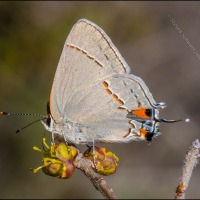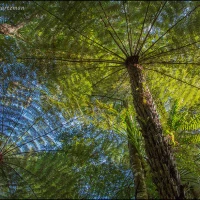Posts Tagged ‘water’
And pretty maids all in a row
At Old Settlers Park in Round Rock on December 14th I couldn’t help noticing a line of turtles on a fallen log in the park’s pond. I took several pictures of them, and after some ducks came on the scene I expanded my scope to include them, as you see. Later a nursery rhyme came to mind and inspired the post’s title. Clicking the panorama will enlarge it substantially.
§
§ §
§
Hamas?
¡Jamás!
Yesterday it dawned on me that those two utterances, the first an Arabic acronym and the second a Spanish adverb, are pronounced the same. The acronym stands for Arabic words meaning “Islamist Resistance Movement.” The Spanish word means “never,” which I find an appropriate response.
© 2023 Steven Schwartzman
Prickly pear, prickly star
On the faintly drizzly morning of November 16th the little bundles of glochids on some of the prickly pear cacti (Opuntia engelmannii) in my northwestern part of Austin looked unusually lush. The one shown here seemed a kind of prickly star.
⚛︎
⚛︎ ⚛︎
⚛︎
To UATX [the University of Austin], the primary purpose of higher education is to uncover, convey, and safeguard knowledge, “and to fulfill these ends, universities must remain committed to open inquiry, intellectual pluralism, freedom of conscience, and civil discourse.”
Students, for example, will spend their first one to two years examining “(among other subjects) the foundations of civilization and political life; the importance of law, virtue, order, beauty, meaningful work and leisure, and the sacred; the unique vibrancy of the American form of government and way of life; and the character and consequences of ideological tyranny,” according to UATX’s curriculum description.
You can read more about the new university being created right here in Austin.
© 2023 Steven Schwartzman
A droplet-covered arc
From the faintly drizzly morning of November 16th comes this
droplet-bedecked leaf arc of a rain lily (Zephyranthes sp.).
⚛︎
⚛︎ ⚛︎
⚛︎
You might find this hard to believe: on a single day last week, the current American administration allowed 10,000 people to illegally enter the United States.
Hours after writing that, I learned that 12,000 people were allowed to enter illegally on December 5th, setting a record for a single day.
Call it lawless, because that’s what it is. Call it intentional, because that’s also what it is.
The current American administration will set many—probably most—of those people loose inside the United States without being able to properly check their backgrounds, thereby contributing to the likelihood of terrorist attacks inside the country. As FBI director Christopher Wray testified before the Senate Judiciary Committee two days ago: “I’ve never seen a time where all the threats, or so many of the threats, are all elevated, all at exactly the same time.”
Don’t say we weren’t warned.
And after writing that, I realized this post is appearing on December 7th.
© 2023 Steven Schwartzman
Water rippling
At the Kimbell Art Museum in Fort Worth on November 2nd I felt compelled to record some abstract views of water rippling in a shallow rectangular pool right outside the building. The first picture might show the Book of Life, don’t you think?
§
§ § §
§
DEI is the Latin word for ‘gods.’ The first of the three gods in the Holy Trinity of DEI that first proselytized and then conquered American universities is said to stand for Diversity, but of course little diversity of opinion exists in that religion. Look at the bar graph below from Mitchell Langbert’s 2018 article “Homogenous: The Political Affiliations of Elite Liberal Arts College Faculty,” which shows the results of a study that included 5,116 professors:
To the right of each blue bar is a number that gives you the ratio of registered Democrats to registered Republicans for professors in that field. For example, the first row in the chart shows that among professors of engineering in the elite institutions surveyed there were 1.6 registered Democrats for each registered Republican. Among professors of history there were 17.4 registered Democrats for each registered Republican. In English departments the ratio was a whopping 48.3 to 1. In the fields of anthropology and communications not a single registered Republican could be found!
And of course that was two years before the moral panic and mass hysteria that swept the nation in 2020, which quickly led to an even greater purging and exclusion of dissenting opinions in academia. So much for the vaunted gods of Diversity and Inclusion!
As Greg Lukianoff and Rikki Schlott put it in the newly released book The Canceling of the American Mind:
University faculties first drifted and then sprinted to the left. Democrats now outnumber Republicans 8.5 to 1. According to recent numbers from the Higher Education Research Institute, merely one in ten professors consider themselves conservative. Meanwhile, one in four identify as “Socialist.”
As the faculty transformed into a left-wing supermajority, it’s little wonder opinions on academic freedom changed. It’s a predictable cycle that’s unfolded time and again throughout history: once your side dominates the rules of decision making, free speech starts to look more like a problem than a solution. In that context, overt ideological discrimination seems acceptable.
Thus has Diversity become Uniformity, and Inclusion now means the Exclusion of anyone with a different opinion.
© 2023 Steven Schwartzman
White Rock Lake Park
In Dallas on the morning of November 1st we stopped at White Rock Lake Park after Eve caught sight of some white egrets (Ardea alba) that had harmoniously arrayed themselves in trees. Once we parked and walked back around, I made portraits of a few egrets I could get closer to, like this one:
And how could I resist white standing above white in the lake’s spillway?

§
In Dallas we stayed for two nights at the Home2 Suites designated “Dallas Medical District Lovefield.” When I first pulled up at the entrance and got out of the car to go inside and check in, I heard an opera aria coming from off to one side. Now, sometimes cars with high-amp stereos blast music, but I’ve never heard one blasting classical music. In online reviews of the hotel that I’d read before booking our room, several people complained about homeless people hanging out on an adjacent property, and it suddenly dawned on me that the 7-Eleven convenience store next door was playing loud opera music in an attempt to drive the homeless people away. Throughout our stay the opera music kept playing, and there were always at least some homeless people on the adjacent property. Whether their numbers were less than they’d been before the opera music, I can’t say.
Though I’d read about the ploy of playing classical music to dispel homeless people, this was my first encounter with it. I later learned there’s at least one 7-Eleven in Austin that’s doing the same thing.
© 2023 Steven Schwartzman
Verdant
Look how lush the maidenhair ferns (Adiantum capillus-veneris), inland sea oats (Chasmanthum latifolium), and other plants were along the trail between Springfield Park and McKinney Falls State Park in southeast Austin on May 21st. Thanks to recent rain, drops were still falling from the roof of the dark little “grotto” at the center. Below you see what an adjacent stretch of Onion Creek was looking like. The large tree with the interesting roots at the right is a bald cypress (Taxodium distichum).
© 2023 Steven Schwartzman
Two raindrops on an appropriate leaf
On April 8th in my part of Austin I made this abstract view of a large raindrop and a small raindrop on an appropriately named leaf, that of a rain lily (Zephyranthes drummondii).
‡
‡ ‡ ‡
‡
Here’s another passage from Helen Joyce‘s 2021 book Trans, whose subtitle is When Ideology Meets Reality.
What same-sex marriage, women’s franchise and the end of segregation all have in common is that they extend the rights of a privileged group to everyone. And when people hear the phrase ‘trans rights’, they assume something similar is being demanded — that trans people be enabled to live without discrimination, harassment and violence, and to express themselves as they wish. Such goals are worthy ones, but they are not what mainstream transactivism is about. What campaigners mean by ‘trans rights’ is gender self-identification: that trans people be treated in every circumstance as members of the sex they identify with, rather than the sex they actually are.
This is not a human right at all. It is a demand that everyone else lose their rights to single-sex spaces, services and activities. And in its requirement that everyone else accept trans people’s subjective beliefs as objective reality, it is akin to a new state religion, complete with blasphemy laws. All this explains the speed. When you want new laws, you can focus on lobbying, rather than the painstaking business of building broad-based coalitions. And when those laws will take away other people’s rights, it is not only unnecessary to build public awareness — it is imperative to keep the public in the dark.
This stealthy approach has been central to transactivism for quite some time. In a speech in 2013, Masen Davis, then the executive director of the American Transgender Law Center, told supporters that ‘we have largely achieved our successes by flying under the radar . . . We do a lot really quietly. We have made some of our biggest gains that nobody has noticed. We are very quiet and thoughtful about what we do, because we want to make sure we have the win more than we want to have the publicity’.
The result is predictable. Even as one country after another introduces gender self-ID, very few voters know this is happening, let alone support it.
© 2023 Steven Schwartzman
Two takes on the main Smith Memorial Trail waterfall
On April 21st, after we had several inches of rain overnight, I made the rounds of some local waterfalls, one of which you’ve already seen. Now here’s the main waterfall that the Smith Memorial Trail lets a person visit along Bull Creek. I started out with tight shots of that waterfall, as shown below. Then I realized there was much to be gained by doing vertical takes that included a lot more of the churning water flowing down the creek at the base of the waterfall; in fact the turbulent water became the primary subject, with the falls playing a supporting role. From one such picture to the next, the configuration of the quickly moving water varied a lot. I particularly like this one for the swirl in the foreground.
© 2023 Steven Schwartzman
Rain lily on the cusp of winter
While we normally and understandably focus on the flowers of rain lilies (Zephyranthes sp.), I considered myself lucky on December 21st to at least find the green leaves of one as winter was about to begin. I think you’ll agree the raindrops didn’t hurt.
⥥
⥥ ⥥ ⥥
⥥
Konstantin Kisin, a short clip of whom I linked to yesterday, recently participated in a debate at the Oxford Union in England. A nine-minute video shows him giving reasons why “This House Believes Woke Culture Has Gone Too Far.” Since the posting of that video nine days ago it has gotten over 700,000 views and over 3000 comments on the Oxford Union’s YouTube channel. The video clip has been reposted on many other websites as well. (Update: here’s a transcription of Kisin’s speech.) You can also read an ABC television station’s article about Kisin’s performance at the debate.
© 2023 Steven Schwartzman
Reflections of different sorts
On October 29th I stopped by the pond on Naruna Way. In other years I’d found good fall plants there, but the banks of the pond seemed to have been recently mowed and therefore temporarily useless for my purposes. Not wanting to come away empty-handed, or more properly empty-sensored, I used a telephoto lens to make abstract pictures of sparkles on the pond in front of (and some behind) a stand of bulrushes.
On November 13th in Great Hills Park I photographed dewdrops on a horizontal spiderweb near the ground. The ring flash I used has two back-to-back almost-semicircular tubes that you see reflected in each dewdrop.
In the picture below, from a small waterfall in Great Hills Park on November 13th, the rapid movement in the bubbles mostly broke up and rearranged the reflections of the two light tubes in the ring flash.
❖
❖ ❖ ❖
❖
In commentaries over the past two years I’ve pointed out the lawlessness at the southern border of the United States. In those two years Mexican cartels have become fabulously rich by taking money from millions of people, bringing them to the border, and showing them how to cross it. In some cases cartel members even brazenly lead the illegal immigrants into the United States. Members of the current American régime encourage this. It’s what they want. They say the border is secure but they’re lying. You know that they’re lying because you can watch television channels that show thousands of people being allowed to illegally enter the United States every day of the year. Actions speak louder than words.
The money that the current American régime asks for to deal with the situation is not to stop or even reduce the flow of illegal entrants but to process them more quickly and let more of them in. Look into the monstrous $1.7 billion spending bill I commented on yesterday. It gives $339.6 million to Immigration and Customs Enforcement for “non-detention border management requirements” [italics mine]. The bill goes out of its way to specifically prohibit that money from being used to “acquire, maintain, or extend border security technology and capabilities.” At the same time, the bill allocates $410 million toward border security for Jordan, Lebanon, Egypt, Tunisia, and Oman. The current administration is okay with using Americans’ money to secure other countries’ borders but adamantly refuses to secure our own. Actions speak louder than words.
If you need more evidence, consider this fact about criminal illegal aliens: “Immigration enforcement in the interior of the country has dropped dramatically under President Biden’s policies. These policies have exempted nearly all but the most serious criminal aliens from arrest and removal and have imposed cumbersome new procedures and paperwork for ICE officers to complete cases. According to ICE records, the number of removals nationwide declined from 186,000 in FY 2020 to 59,000 in FY 2021.” That’s a 68% decline in the deportation of criminal illegal aliens. In other words, the current administration allowed 126,000 people who had entered the country illegally and who also were criminals to stay here anyhow. Actions speak louder than words.
Facts speak louder than lies.
© 2022 Steven Schwartzman


























